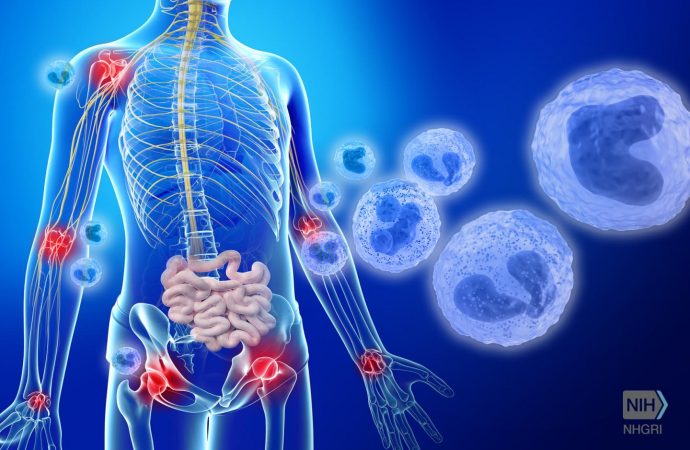Scientists recently added a new disease to the scope of immune disorders that attack the hosts’ own tissues. Otulipenia, a rare and often lethal disease, affects mainly young children, causing skin rashes, joint inflammation, fever, diarrhea and failure to grow and thrive.
Finding the responsible
Researchers from the NIH, National Institutes of Health, identified four children with unexplained skin rashes and inflamed joints. Through next-generation DNA-sequencing techniques, OTULIN came up as the most likely gene to be affected in those four children.

Localized in the chromosome 5, the OTULIN gene is responsible for regulating the development of blood vessels and mobilizing proteins to fight infections. Moreover, this gene is directly involved in the regulation of ubiquitin, a critical protein in controlling several immune pathways. In children with otulipenia, the de-regulation of the OTULIN gene affects the normal production of ubiquitin products, leading to an abnormal accumulation of inflammatory molecules.
We have achieved the important goal of helping these young patients and made progress in understanding the biological pathways and proteins that are important for the regulation of the immune system’s responses.
Daniel Kastner, co-author of the study
Finding a treatment
The search for a new therapy has already begun. Researchers have found that anti-inflammatory drugs inhibiting TNF (tumor necrosis factor), a chemical messenger involved in systemic inflammation, might improve symptoms of patients with otulipenia. Anti-TNF drugs are already widely used for the treatment of other inflammatory diseases, like rheumatoid arthritis.
For now, the discovery of a new inflammatory disease seems to suggest a strong link between ubiquitin and inflammation, a pattern also found in the recently discovered disease haploinsufficiency A20.
References:
Zhou, Q., Wang, H., Schwartz, D., Stoffels, M., Park, Y., Zhang, Y., Yang, D., Demirkaya, E., Takeuchi, M., Tsai, W., Lyons, J., Yu, X., Ouyang, C., Chen, C., Chin, D., Zaal, K., Chandrasekharappa, S., P Hanson, E., Yu, Z., Mullikin, J., Hasni, S., Wertz, I., Ombrello, A., Stone, D., Hoffmann, P., Jones, A., Barham, B., Leavis, H., van Royen-Kerkof, A., Sibley, C., Batu, E., Gül, A., Siegel, R., Boehm, M., Milner, J., Ozen, S., Gadina, M., Chae, J., Laxer, R., Kastner, D., & Aksentijevich, I. (2015). Loss-of-function mutations in TNFAIP3 leading to A20 haploinsufficiency cause an early-onset autoinflammatory disease Nature Genetics, 48 (1), 67-73 DOI: 10.1038/ng.3459
Elliott, P., Nielsen, S., Marco-Casanova, P., Fiil, B., Keusekotten, K., Mailand, N., Freund, S., Gyrd-Hansen, M., & Komander, D. (2014). Molecular Basis and Regulation of OTULIN-LUBAC Interaction Molecular Cell, 54 (3), 335-348 DOI: 10.1016/j.molcel.2014.03.018
NIH – press releases





